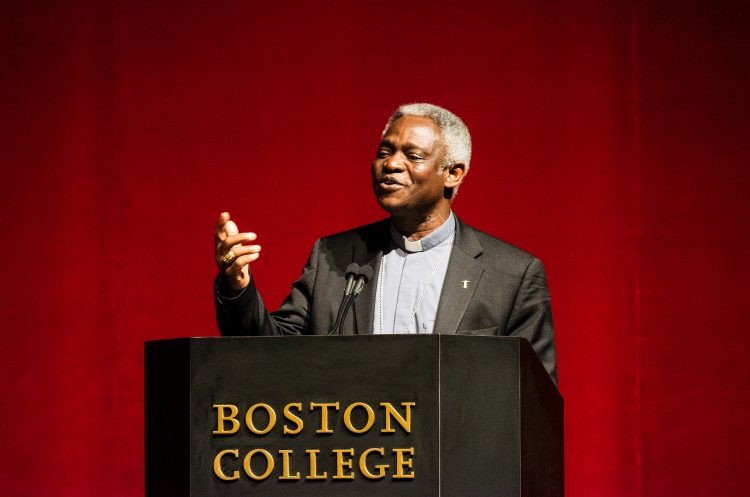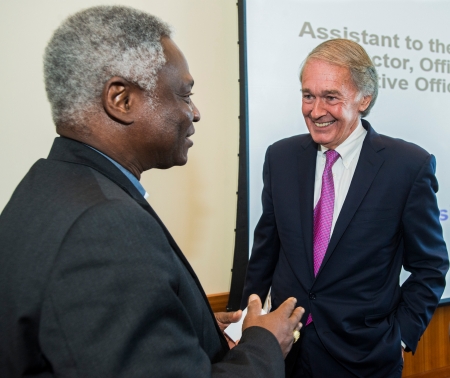
By
On the heels of Pope Francis’ landmark visit to the United States, US Sen. Edward Markey (D-Mass.) ’68, JD ’72 and papal advisor Cardinal Peter K.A. Turkson told audiences at Boston College on Monday that the pontiff’s stance on the environment can help mobilize world leaders to work together to combat climate change.
Speaking to a capacity crowd in Robsham Theater, Cardinal Turkson, who led a Vatican working group that helped draft the pope’s environmental encyclical, Laudato Si’, said that Pope Francis’ pastoral approach asks leaders to focus on the natural world in the broadest possible sense.
“More than any other leader today, the pope firmly links the issues of the natural world with those of the social world,” said Cardinal Turkson, president of the Pontifical Council on Peace and Justice at the Vatican. “The pope speaks to the longing of people to be cared for and in turn to exercise caring. He brings the basic message of Jesus – ‘love one another, as I have loved you’ – into the very heart of the world’s greatest challenges: to care for the poor and to care for the planet.”
Cardinal Turkson’s address, “Sustainable Humanity, Sustainable Planet,” was a highlight of the four-day conference “Our Common Home: An Ethical Summons to Tackle Climate Change,” which examined the global impact of the encyclical on faith, environmental policy and social justice. The conference ends this afternoon.
Earlier on Monday, Markey told an audience in the Yawkey Center’s Murray Room that the pope’s stance places the onus on world leaders to assess their nations’ efforts to reduce man-made pollutants and processes that scientists have tied to rising temperatures in the atmosphere and oceans.

“Pope Francis and the encyclical give us the opportunity to examine our own policies, the impact they have on our country and our planet,” said Markey. “It is our duty as leaders to take action. Mankind created the problem of climate change and mankind must take steps to undo that damage.”
A legislative leader in efforts to combat climate change and preserve the environment, Markey said the pope’s influence will be felt at COP21, an international climate conference that takes place in Paris in early December. Furthermore, he expects President Obama to advance America’s leadership role on the issue.
Markey said US policies that reduce fossil fuel use and carbon emissions will have a ripple effect throughout the world. He cited recent climate policy advances in China, India, Brazil and the European Union as evidence that the work of US policymakers has influenced the international community.
“None of this was on the table a year ago,” said Markey. “The good news is that it is now moving.”
In Washington DC, Markey said lawmakers will likely be motivated by economic benefits associated with new regulations, such as a projected growth in clean energy jobs to 300,000 next year.
Though partisan politics have dealt a blow to many proposals, including a 2007 climate bill co-authored by Markey, he said there are more legislative battles to be fought.
“You don’t win them all, but you have to fight them all if you want to change the course of history,” Markey said.
White House Office of Science and Technology Director John Holdren followed Markey, delivering a primer on the latest science that connects climate change to a range of environmental degradation now putting humans and communities at risk.
Organized by an interdisciplinary group of faculty, students and staff, “Our Common Home” featured a range of speakers from various disciplines and backgrounds, including international immigration expert and BC School of Social Work adjunct faculty member Sister Maryanne Loughry, RSM, of Jesuit Refugee Service Australia, who discussed the impact of climate change on the poor; New York Times “Dot.earth” columnist Andrew Revkin, who spoke on media coverage of climate change; and Catholic Climate Change Executive Director Dan Misleh, who talked about the impact of the encyclical on Catholic social teaching.
The conference’s final day begins this morning with a 10 a.m. reflection led by Campus Ministry at the Stokes Amphitheater, followed by a “What Can I Do?” Fair on the Campus Green at noon, and a speech by Tufts University Professor Julian Agyeman at 3:30 p.m. on the Campus Green.
Canisius Professor James Keenan, SJ, a lead organizer of the event, said Cardinal Turkson’s decision to attend the event helped to create a distinguished list of guest speakers and panelists.
“In many ways, what we were able to do started with Cardinal Turkson’s decision to join us and be one of our keynote speakers,” said Fr. Keenan, director of the Jesuit Institute. “He is the recognized authority on the encyclical and his presence brought many of the leading scholars and thinkers in this field to campus to speak about an issue of crucial importance to us all.”
See this website for more information on “Our Common Home."



